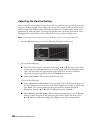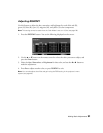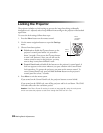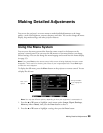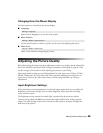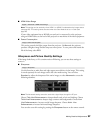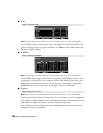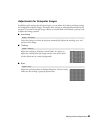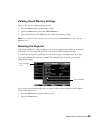
38 Making Detailed Adjustments
■ Progressive
Note: This setting can be used only when viewing composite video or S-video signals, or 480i,
576i, or 1080i signals input through the Component, HDMI 1, or HDMI 2 ports (see page 65).
Converts interlaced to progressive signals. The projector uses 3D DigiScan
™
HD
Circuitry Processing for video-sourced images. For film-sourced images, you can select
from 2-2 or 2-3 pulldown detection (see below).
Leave the setting on
Film/Auto for viewing movies on a player that produces interlaced
output. Select
Video for watching videos captured with a video camera. Set to Off when
viewing images with a large amount of movement.
■ Motion Detection
Note: This setting can be used only when viewing composite video or S-Video signals, or 480i
or 576i, or 1080i signals input through the Component, HDMI 1, or HDMI 2 ports (see page 65).
This setting specifies how signals are converted to progressive signals. Select a lower
setting for slow-moving or still images (
S) or select a higher number for video
images (
M).
■ Noise Reduction
Note: This setting cannot be used with a signal input through the PC port.
This setting reduces flickering of analog images. You can select from 3 levels of noise
reduction.
■ 2-2 Pull-down
Note: This setting can be used only when viewing a 1080p/24Hz signal input through the
Component, HDMI 1, or HDMI 2 ports (see page 65). This setting cannot be used with a signal
input through the PC port.
This setting allows you to select whether images are projected with 2-2 pulldown
detection or 2-3 pulldown detection. Select
On for 2-2 pulldown detection.
Signal > Progressive
Signal > Motion Detection
Signal > Advanced > Noise Reduction
Signal > 2-2 Pull-down



